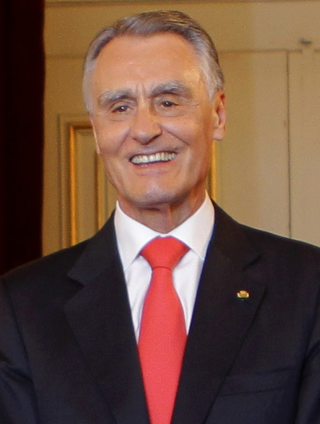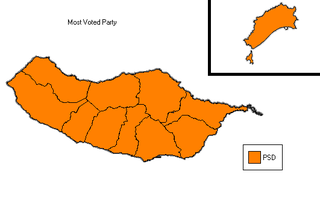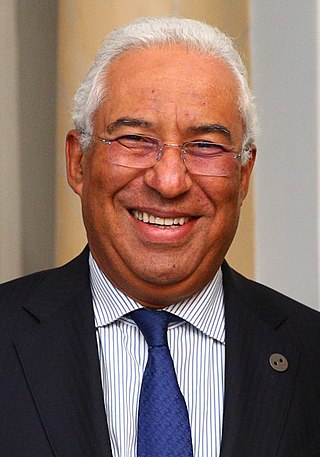| |||||
| Centuries: | |||||
|---|---|---|---|---|---|
| Decades: | |||||
| See also: | List of years in Portugal | ||||
The following lists events in the year 2015 in Portugal .
| |||||
| Centuries: | |||||
|---|---|---|---|---|---|
| Decades: | |||||
| See also: | List of years in Portugal | ||||
The following lists events in the year 2015 in Portugal .




Politics in Portugal operates as a unitary multi-party semi-presidential representative democratic republic, whereby the Prime Minister of Portugal is the head of government, and the President of Portugal is the non-executive head of state with several significant political powers they exercise often. Executive power is exercised by the Government, whose leader is the Prime Minister. Legislative power is primarily vested in the Assembly of the Republic, although the government is also able to legislate on certain matters. The Judiciary of Portugal is independent of the executive and the legislature. The President exerts a sort of "moderating power", not easily classified into any of the traditional three branches of government.

The Socialist Party is a social-democratic political party in Portugal. It was founded on 19 April 1973 in the German city of Bad Münstereifel by militants who were at the time with the Portuguese Socialist Action. The PS is a member of the Socialist International, Progressive Alliance and Party of European Socialists, and has nine members in the European Parliament within the Progressive Alliance of Socialists and Democrats group during the 9th European Parliament. It is the governing party of Portugal since the 2022 legislative election.

The Social Democratic Party is a liberal-conservative political party in Portugal. Commonly known by its colloquial initials PSD, on ballot papers its initials appear as its official form PPD/PSD, with the first three letters coming from the party's original name, the Democratic People's Party. A party of the centre-right, the PSD is one of the two major parties in Portuguese politics, its rival being the Socialist Party (PS) on the centre-left.

The CDS – People's Party is a conservative and Christian democratic political party in Portugal. It is characterized as being between the centre-right and right-wing of the political spectrum. In voting ballots, the party's name appears only as the People's Party, with the abbreviation CDS–PP unchanged.
Since the beginning of liberalism in Portugal in the 19th century, several parties have, by gaining representation in parliament, continued the liberal ideology in contemporary Portuguese politics. But after the initial fervor of the Liberal Revolution of 1820 and the outcome of the Liberal Wars (1828–1834) during the 19th century, liberalism was relegated to a secondary role in Portuguese politics and government and even outlawed for periods of time. The first fully-fledged liberal party founded as such to have a seat in the Portuguese Parliament since the end of the First Portuguese Republic (1910–1926), was the Liberal Initiative, in 2019.

Joaquim Fernando Nogueira, commonly known just as Fernando Nogueira, is a Portuguese lawyer and former politician.

Aníbal António Cavaco Silva, GCC, GColL, GColIH is a Portuguese economist who served as the 19th president of Portugal, in office from 9 March 2006 to 9 March 2016. He had been previously prime minister of Portugal from 6 November 1985 to 28 October 1995. His 10-year tenure was the longest of any prime minister since António de Oliveira Salazar, and he was the first Portuguese prime minister to win an absolute parliamentary majority under the current constitutional system. He is best known for leading Portugal into the European Union.

The 2009 Portuguese legislative election was held on 27 September, to renew all 230 members of the Assembly of the Republic. The Socialist Party, led by incumbent Prime Minister José Sócrates, won the largest number of seats, but didn't repeat the overall majority they gained in 2005.

Pedro Manuel Mamede Passos Coelho better known as Pedro Passos Coelho is a Portuguese politician and university guest lecturer who was the 118th prime minister of Portugal, in office from 2011 to 2015. He was the leader of the Social Democratic Party (PSD) between 2010 and 2018.

The 2011 Portuguese legislative election was held on 5 June, to elect all 230 members of the Assembly of the Republic. Pedro Passos Coelho led the centre-right Social Democratic Party to victory over the Socialist Party, led by incumbent Prime Minister José Sócrates. Despite a historically low turnout of less than 60% of registered voters, the right-wing won a clear mandate, winning nearly 130 MPs, more than 56% of the seats, and just over 50% of the vote. While the People's Party, continuing the trend they began in 2009, earned their best score since 1983, the Social Democrats exceeded the expected result in the opinion polls and won the same number of seats as they did in 2002, when the PSD was led by José Manuel Durão Barroso. Of the twenty districts of the country, Pedro Passos Coelho's party won seventeen, including Lisbon, Porto, Faro, Portalegre, Castelo Branco, Coimbra, Santarém and the Azores, that tend to favor the Socialist Party.

The 2015 Portuguese legislative election was held on 4 October. All 230 seats of the Assembly of the Republic were in contention.

A regional election was held in Madeira on 29 March 2015, to determine the composition of the Legislative Assembly of the Autonomous Region of Madeira. The election was the first in which the former President of the Region, Alberto João Jardim, was not on the ballot as he earlier stated that he would step down as President and leader of the PSD-Madeira in January 2015. On 29 December 2014, the PSD-Madeira elected Miguel Albuquerque as the new president of the party's regional section. After winning the presidency, Albuquerque stated that he would not assume the Presidency of the Government without an election, so Alberto João Jardim asked President Aníbal Cavaco Silva to dissolve the Parliament and call an election, which was scheduled for 29 March.

The 2019 Portuguese legislative election was held on 6 October 2019. All 230 seats to the Assembly of the Republic were contested.

The Portuguese local elections of 2017 were held on October 1, 2017. The elections consisted of three separate elections in the 308 Portuguese municipalities, the election for the Municipal Chambers, whose winner was elected mayor, another election for the Municipal Assembly, as well an election for the lower-level Parish Assembly, whose winner was elected parish president. This last election was held in the more than 3,000 parishes around the country. In the 2017 election, 13.3% of incumbent mayors, 41 to be precise, were barred from running for another term.
The following lists events during 2016 in Portugal.

Graça Maria da Fonseca Caetano Gonçalves is a Portuguese politician who served as Minister of Culture in the government of Prime Minister António Costa since 15 October 2018. Fonseca graduated with a law degree from the University of Lisbon, has a master's degree in economics from the University of Coimbra, and obtained a PhD in sociology from ISCTE – University Institute of Lisbon. From 26 November 2015 to 15 October 2018, Fonseca served as Secretary of State Assistant and of Administrative Modernisation.

The 2021 Portuguese Social Democratic Party leadership election was held on 27 November. If no candidate achieved more than 50% of the votes in the first round, a second round would be held between the two most voted candidates in the first round on 1 December, however, as only two candidates will be on the ballot, a second round will not be necessary. The original date for the first round was 4 December, but the party decided to advance the date by a week.

Luís Filipe Montenegro Cardoso de Morais Esteves is a Portuguese politician who is the President of the Social Democratic Party (PSD). He was a member of the Assembly of the Republic from the Aveiro District from 2002 to 2018, leading his party's parliamentary group from 2011. He was defeated by Rui Rio in his party's 2020 leadership election, and won against Jorge Moreira da Silva in 2022.

Patrícia Dantas is a Mozambique-born Portuguese economist and politician. A member of the centre-right Social Democratic Party (PSD), she was elected to the Assembly of the Republic in January 2022, as a representative of the Madeira constituency.
This is the results breakdown of the Assembly of the Republic election held in Portugal on 4 October 2015. The following tables show detailed results in each of the country's 22 electoral constituencies.